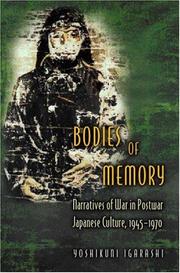| Listing 1 - 10 of 21 | << page >> |
Sort by
|

ISBN: 0691049122 0691049114 Year: 2000 Publisher: Princeton Princeton university press
Abstract | Keywords | Export | Availability | Bookmark
 Loading...
Loading...Choose an application
- Reference Manager
- EndNote
- RefWorks (Direct export to RefWorks)
Japan and the United States became close political allies so quickly after the end of World War II, that it seemed as though the two countries had easily forgotten the war they had fought. Here Yoshikuni Igarashi offers a provocative look at how Japanese postwar society struggled to understand its war loss and the resulting national trauma, even as forces within the society sought to suppress these memories. Igarashi argues that Japan's nationhood survived the war's destruction in part through a popular culture that expressed memories of loss and devastation more readily than political discourse ever could. He shows how the desire to represent the past motivated Japan's cultural productions in the first twenty-five years of the postwar period. Japanese war experiences were often described through narrative devices that downplayed the war's disruptive effects on Japan's history. Rather than treat these narratives as obstacles to historical inquiry, Igarashi reads them along with counter-narratives that attempted to register the original impact of the war. He traces the tensions between remembering and forgetting by focusing on the body as the central site for Japan's production of the past. This approach leads to fascinating discussions of such diverse topics as the use of the atomic bomb, hygiene policies under the U.S. occupation, the monstrous body of Godzilla, the first Western professional wrestling matches in Japan, the transformation of Tokyo and the athletic body for the 1964 Tokyo Olympics, and the writer Yukio Mishima's dramatic suicide, while providing a fresh critical perspective on the war legacy of Japan.
J3000 --- J3384 --- J3389 --- Japan: History -- historiography, theory, methodology and philosophy --- Japan: History -- Gendai, modern -- Shōwa period -- World War II (1931-1945) --- Japan: History -- Gendai, modern -- Shōwa period -- World War II -- occupation period (1945-1952) --- Japan --- Civilization
Book
ISBN: 3110398974 3486856987 Year: 2014 Publisher: München ; Wien : De Gruyter Oldenbourg,
Abstract | Keywords | Export | Availability | Bookmark
 Loading...
Loading...Choose an application
- Reference Manager
- EndNote
- RefWorks (Direct export to RefWorks)
Edgar N. Johnson, Professor für europäische Geschichte an der University of Nebraska, kam Anfang März 1946 in die Viermächtestadt Berlin, um wichtige Aufgaben für die amerikanische Militärregierung zu übernehmen. Von General Lucius D. Clay, dem stellvertretenden Militärgouverneur, zum Special Assistant ernannt, wurde er gleichzeitig als politischer Berater des amerikanischen Stadtkommandanten von Berlin eingesetzt. Über seine fünf Monate in der alten Reichshauptstadt, seine Begegnungen mit besatzungspolitischen Akteuren und deutschen Persönlichkeiten aus Politik und Kultur, seine Beobachtungen, Gedanken und Einsichten geben die Briefe an Ehefrau Emily und ein von ihm nach seinem Deutschlandaufenthalt verfasster Bericht detailliert Auskunft. Diese Aufzeichnungen eröffnen uns ein vielschichtiges Panorama von Besatzungsalltag und politischem Wiederaufbau in Berlin 1946. Band 18 der Schriftenreihe des Landesarchivs Berlin.
Berlin --- Johnson, Edgar Nathaniel, 1901-1969 --- Berlin. --- Besatzungszeit. --- German-American history. --- Nachkriegszeit. --- Wiederaufbau. --- deutsch-amerikanische Geschichte. --- occupation period. --- post-war era. --- reconstruction. --- History --- 1945-1990 --- Sources. --- Correspondence. --- Johnson, Edgar Nathaniel, --- Berlin (Germany)
Book
ISBN: 0029060508 Year: 1987 Publisher: New York : Free Press,
Abstract | Keywords | Export | Availability | Bookmark
 Loading...
Loading...Choose an application
- Reference Manager
- EndNote
- RefWorks (Direct export to RefWorks)
J3389 --- J4815.11 --- J4000.80 --- Japan: History -- Gendai, modern -- Shōwa period -- World War II -- occupation period (1945-1952) --- Japan: International politics and law -- international relations, policy and security -- North America -- United States --- Japan: Social history, history of civilization -- Gendai (1926- ), Shōwa period, 20th century --- Japan --- History

ISBN: 9780415415897 0415415896 9780203964255 9781134118571 9781134118618 9781134118625 9780415560597 Year: 2007 Publisher: London Routledge
Abstract | Keywords | Export | Availability | Bookmark
 Loading...
Loading...Choose an application
- Reference Manager
- EndNote
- RefWorks (Direct export to RefWorks)
J4000.90 --- J4600.90 --- J3389 --- Japan: Social history, history of civilization -- postwar Shōwa (1945- ), Heisei period (1989- ), contemporary --- Japan: Politics and law -- history -- postwar Shōwa (1945- ), Heisei period (1989- ), contemporary --- Japan: History -- Gendai, modern -- Shōwa period -- World War II -- occupation period (1945-1952) --- Democracy --- Japan --- United States --- Civilization --- American influences. --- Foreign relations --- History --- Politics and government
Book
ISBN: 9780231701587 0231701586 9781849040525 1849040524 Year: 2010 Publisher: London Hurst
Abstract | Keywords | Export | Availability | Bookmark
 Loading...
Loading...Choose an application
- Reference Manager
- EndNote
- RefWorks (Direct export to RefWorks)
"Sasakawa Tyoichi's Sugamo Diary is a fascinating document, and Sasakawa is a fascinating person. His prison-based reflections and attitude toward communists and his American captors, as well as toward fellow Japanese citizens, including the emperor and other class-A war criminals, all make for fascinating reading."--John Breen, editor Yasukuni, the War Dead and the Struggle for Japan's Past. Sasakawa Ryoichi was a wealthy business tycoon, statesman, nationalist leader, philanthropist, and suspected war criminal. Many have also cast him as a Japanese don, power broker, political fixer, and right-wing godfather. In these diaries and letters, written by Sasakawa himself, a strikingly different picture emerges, one that reveals a man fighting to adhere to his convictions within an ethical system that placed Japan's well-being above all other concerns. From 1945 to 1948, Sasakawa was imprisoned in Sugamo with a host of other class-A war criminals. His path to incarceration was uniquely dramatic: he volunteered for indictment in order to protect the emperor and the nation from the consequences of victor's justice. Sasakawa's motivations are apparent in his writing, along with his relentless criticism of Japan's wartime leaders, in which he challenges the behavior of the Tokyo court and warns against the adoption of postwar Japanese communism. Sasakawa instead proposed that Japan pursue friendly relations with the West, including the United States. After his release in 1948, he founded what is now the Nippon Foundation, a philanthropic body that became, under his leadership, Japan's largest charitable organizations. Through an intimate encounter with Sasakawa's thoughts, struggles, and philosophy, this vibrant volume introduces one of the twentieth century's most influential political figures.
Industrialists --- War criminals --- Sasakawa, Ryōichi, --- Japan --- Economic conditions --- History --- Social conditions --- Criminals --- Manufacturers --- Businesspeople --- Sasakawa, Ryōichi, --- Sasagawa, Ryōichi, --- 笹川良一, --- J2284.80 --- J4122 --- J3389 --- Japan: Genealogy and biography -- biographies -- Gendai, modern (1926- ), Shōwa, 20th century --- Japan: Sociology and anthropology -- nationalism --- Japan: History -- Gendai, modern -- Shōwa period -- World War II -- occupation period (1945-1952)

ISSN: 09256512 ISBN: 9004155465 9789004155466 9786611458096 1281458090 9047411668 9789047411666 9781281458094 Year: 2007 Volume: v. 26 Publisher: Leiden Boston Brill
Abstract | Keywords | Export | Availability | Bookmark
 Loading...
Loading...Choose an application
- Reference Manager
- EndNote
- RefWorks (Direct export to RefWorks)
The reconstruction of identity in post World War II Japan after the trauma of war, defeat and occupation forms the subject of this latest volume in Brill's monograph series Japanese Studies Library. Closely examining the role of fiction produced during the Allied Occupation, Sharalyn Orbaugh begins with an examination of the rhetoric of wartime propaganda, and explores how elements of that rhetoric were redeployed postwar as authors produced fiction linked to the redefinition of what it means to be Japanese. Drawing on tools and methods from trauma studies, gender and race studies, and film and literary theory, the study traces important nodes in the construction and maintenance of discourses of identity through attention to writers’ representations of the gaze, the body, language, and social performance. This book will be of interest to any student of the literary or cultural history of World War II and its aftermath. Japanese Fiction of the Allied Occupation was awarded Choice Outstanding Academic Title 2007 .
Japanese fiction --- Military occupation in literature --- J3389 --- J5930 --- Japanese literature --- History and criticism --- Japan: History -- Gendai, modern -- Shōwa period -- World War II -- occupation period (1945-1952) --- Japan: Literature -- modern fiction and prose (1868- ) --- Japan --- History --- Fictie. --- Tweede Wereldoorlog. --- History and criticism. --- Japan.
Book
ISBN: 9781501703089 1501703080 1501707833 1501707841 9781501707834 9781501707841 9781501708183 150170818X 9781501708176 1501708171 Year: 2017 Publisher: Ithaca
Abstract | Keywords | Export | Availability | Bookmark
 Loading...
Loading...Choose an application
- Reference Manager
- EndNote
- RefWorks (Direct export to RefWorks)
The Allied occupation of Japan is remembered as the "good occupation." An American-led coalition successfully turned a militaristic enemy into a stable and democratic ally. Of course, the story was more complicated, but the occupation did forge one of the most enduring relationships in the postwar world. Recent events, from the occupations of Iraq and Afghanistan to protests over American bases in Japan to increasingly aggressive territorial disputes between Asian nations over islands in the Pacific, have brought attention back to the subject of the occupation of Japan.In Architects of Occupation, Dayna L. Barnes exposes the wartime origins of occupation policy and broader plans for postwar Japan. She considers the role of presidents, bureaucrats, think tanks, the media, and Congress in policymaking. Members of these elite groups came together in an informal policy network that shaped planning. Rather than relying solely on government reports and records to understand policymaking, Barnes also uses letters, memoirs, diaries, and manuscripts written by policymakers to trace the rise and spread of ideas across the policy network. The book contributes a new facet to the substantial literature on the occupation, serves as a case study in foreign policy analysis, and tells a surprising new story about World War II.
Japanologists --- Postwar reconstruction --- Policy sciences --- J3389 --- J4000.80 --- Policy-making --- Policymaking --- Public policy management --- Post-conflict reconstruction --- Reconstruction, Postwar --- Japanese studies specialists --- East Asia specialists --- History --- Planning --- Japan: History -- Gendai, modern -- Shōwa period -- World War II -- occupation period (1945-1952) --- Japan: Social history, history of civilization -- Gendai (1926- ), Shōwa period, 20th century --- Japan --- United States --- Foreign relations --- Planning. --- United States. --- Japan.
Book
ISBN: 9784866581255 4866581255 Year: 2021 Publisher: Chiyoda-ku, Tokyo : Japan Publishing Industry Foundation for Culture,
Abstract | Keywords | Export | Availability | Bookmark
 Loading...
Loading...Choose an application
- Reference Manager
- EndNote
- RefWorks (Direct export to RefWorks)
Following its defeat in World War II, Japan was placed under the control of SCAP GHQ headed by General Douglas MacArthur. Initially, the Occupation promoted policies of demilitarization and democratization. A new Japanese constitution which pursued pacifism was established. However, as the Cold War intensified, policies switched in the direction of economic recovery, and it was contended that Japan should take the anti-Communist pro-America path. In 1951, at the height of the Korean War, the San Francisco Peace Treaty and the Japan-U.S. Security Treaty were concluded as a fixed set. Winner of the 2015 Yomiuri Yoshino Sakuzo Prize for academic writing on politics, economics, and history, this book provides a wide view of the seven years of the Occupation of Japan which led to the 'postwar system' that has continued into the twenty-first century. --
J3389 --- J3389.80 --- Japan: History -- Gendai, modern -- Shōwa period -- World War II -- occupation period (1945-1952) --- Japan: History -- Gendai, modern -- Shōwa period -- World War II -- occupation and return of Okinawa (1945-1972) --- Japan --- United States --- History --- Politics and government --- Foreign relations

ISBN: 1929280068 9781929280063 Year: 2001 Volume: 22 Publisher: Ann Arbor University of Michigan. Center for Japanese studies
Abstract | Keywords | Export | Availability | Bookmark
 Loading...
Loading...Choose an application
- Reference Manager
- EndNote
- RefWorks (Direct export to RefWorks)
Tokyo Trial, Tokyo, Japan, 1946-1948 --- J4833.20 --- J4850 --- J3389 --- Japan: International politics and law -- international court -- International Military Tribunal for the Far East (1946-1948) --- Japan: International law -- law of peace and war (including war crimes) --- Japan: History -- Gendai, modern -- Shōwa period -- World War II -- occupation period (1945-1952) --- Tokyo Trial, 1946-1948 --- Tokyo War Crimes Trial, Tokyo, Japan, 1946-1948 --- War crime trials --- Tokyo Trial, Tokyo, Japan, 1946-1948.
Book
ISBN: 9780674052413 0674052412 Year: 2019 Publisher: Cambridge Harvard University Press
Abstract | Keywords | Export | Availability | Bookmark
 Loading...
Loading...Choose an application
- Reference Manager
- EndNote
- RefWorks (Direct export to RefWorks)
At the close of the Second World War, it became the policy of the United States to cause the permanent demilitarization of Nazi Germany and Imperial Japan by their compulsory democratization during a period of military occupation. For American leaders, the indispensable precondition of the democratic political order was the rule of law. This book, then, tells the story of how American agencies designed and implemented the two greatest law reform projects in the history of the world. It is a comparative study of American action and German and Japanese reaction to directed legal and political change. The book explores the capacities and incapacities of mid-20th century Americans in remaking foreign legal and political ideas and institutions. It investigates how and why American agencies helped construct and then, in the first phase of the Cold War, undermine liberal legal revolutions in Germany and Japan.--
Civilization --- Law --- Law. --- Politics and government. --- Reconstruction (1939-1951) --- Reconstruction (1939-1951). --- American influences. --- American influences --- History --- Allied Occupation of Japan (1945-1952). --- 1900-1999. --- Germany --- Germany. --- Japan --- Japan. --- Politics and government --- Acts, Legislative --- Enactments, Legislative --- Laws (Statutes) --- Legislative acts --- Legislative enactments --- Jurisprudence --- Legislation --- United States --- J3389 --- J4600.90 --- Japan: History -- Gendai, modern -- Shōwa period -- World War II -- occupation period (1945-1952) --- Japan: Politics and law -- history -- postwar Shōwa (1945- ), Heisei period (1989- ), contemporary
| Listing 1 - 10 of 21 | << page >> |
Sort by
|

 Search
Search Feedback
Feedback About
About Help
Help News
News